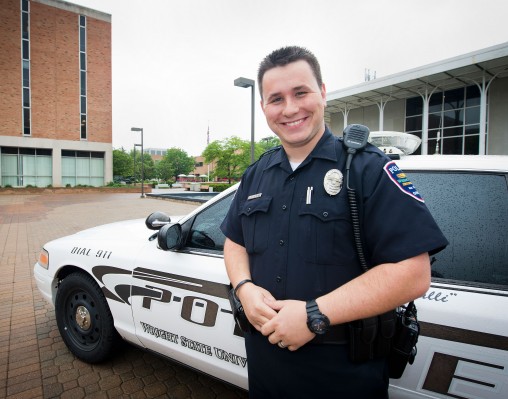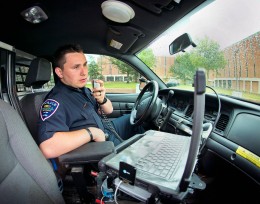
Wright State police officer Kurt Holden relishes the chance to help young people who might need more than luck to achieve their dreams.
Wright State patrolman Kurt Holden entered the foster care system at such an early age he doesn’t remember when it all began. What he does know are the simple facts that tell a story of a disjointed and unsupported childhood.
One of four brothers whose parents were heavily into drugs and alcohol, Holden spent time in numerous foster homes, and most of the time he lived separately from his siblings.
“Statistically most foster kids don’t end up in good situations when they are emancipated—which means, at 18 you get shoved out on your own and told ‘good luck,’” said Holden.
Now working as a patrolman with the Wright State police department, Holden relishes the chance to help young people who might need more than luck to achieve their dreams.

Whether he’s giving a talk about drug and alcohol awareness, personal safety or sexual assault prevention, Holden sees each as a chance to be both an officer and a friend.
Holden saw the police often on the streets of his West Dayton foster homes. And for him, the cops represented the stabilizing force he yearned for.
“A lot of people in the neighborhood thought the police could get a little rough, but I always saw them restore peace out of a crisis situation,” recalled Holden. “They’d always been nice to me. I’d always seen them do good things. I wanted to do that.”
As a young teen, Holden left Dayton and went to his final foster home in Tipp City, where the sirens of police cruisers were less frequent and home life was more predictable.
“In Tipp they said, ‘Kurt, yes your past is bad, but you have the power to make what you want for your future,’” said Holden.
Holden stopped getting into so many fights at school and started applying himself to his studies and athletics. He found a life that was less chaotic and graduated at 17.
“I knew I needed to go to school and find something I wanted to do. I knew I wanted to help people,” said Holden.
With no family support network, financial or otherwise, Holden chose to go to Wright State but found his freshman year tough.
Wright State had not yet created the Independent Scholars Network, which today helps students who emancipate from foster care with a wide range of services, including help with living arrangements and employment opportunities.
After a year in which he kept up with his studies, “but worked at just about every restaurant near campus,” Holden left the university in good standing and transferred to Sinclair Community College.
A couple years later, he earned a degree and graduated from the police academy. His first job as a police officer would take him right back to Wright State.
“On the back of our cruisers it says, ‘Protecting the Future,’ and I truly believe that we are doing that,” said Holden.
He may have a badge, but on the crime prevention unit, Holden often works as a teacher. Whether he’s giving a talk about drug and alcohol awareness, personal safety or sexual assault prevention, Holden sees each as a chance to be both an officer and a friend.
Holden’s best friend might just be Galli, the Belgian Malinois who never leaves his side as the K-9 officer. She and Holden have made quite the team since their pairing two years ago. A bomb dog by trade, Galli is most often used for safety sweeps before big events. She and Holden keep busy averaging a couple calls a month for events across the state.
But the role Holden is most proud of doesn’t involve a badge or his dog. As a mentor in the Independent Scholars Network, he tries to offer emancipated freshman what he never got—support and stability on their college journey.
“When you grow up as a foster kid, you see all these other kids with a lot of people pushing and supporting them in high school and college,” said Holden. “These emancipated kids, a lot of times they know what they want to do, but nobody is being that extra hand or voice to help them accomplish their goals. I try to help with that.”
“When I was young and in a rough patch, police officers would talk to me and say, ‘Kurt, you’re a good guy, why are you doing this?’ They’d help me know that I can be something great,” said Holden. “Because of that, I felt that they were great, and I want to be just like them for kids that need help here too.”

 Difficult conversations
Difficult conversations  Celebrated Wright State alum serving his community as surgeon
Celebrated Wright State alum serving his community as surgeon  Wright State University Foundation awards Students First Fund grants
Wright State University Foundation awards Students First Fund grants  Cosmic collection
Cosmic collection  Wright State revives student-faculty collaborative writing journal
Wright State revives student-faculty collaborative writing journal 